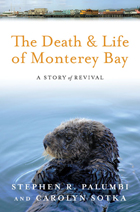115 books about Citizen participation and 3
start with D
115 books about Citizen participation and 3
115 books about Citizen participation
3 start with D start with D
3 start with D start with D

The Death and Life of Monterey Bay
A Story of Revival
Stephen R Palumbi and Carolyn Sotka
Island Press, 2012
Anyone who has ever stood on the shores of Monterey Bay, watching the rolling ocean waves and frolicking otters, knows it is a unique place. But even residents on this idyllic California coast may not realize its full history. Monterey began as a natural paradise, but became the poster child for industrial devastation in John Steinbeck’s Cannery Row,and is now one of the most celebrated shorelines in the world.
It is a remarkable story of life, death, and revival—told here for the first time in all its stunning color and bleak grays. The Death and Life of Monterey Bay begins in the eighteenth century when Spanish and French explorers encountered a rocky shoreline brimming with life—raucous sea birds, abundant sea otters, barking sea lions, halibut the size of wagon wheels,waters thick with whales. A century and a half later, many of the sea creatures had disappeared, replaced by sardine canneries that sickened residents with their stench but kept the money flowing. When the fish ran out and the climate turned,the factories emptied and the community crumbled. But today,both Monterey’s economy and wildlife are resplendent. How did it happen?
The answer is deceptively simple: through the extraordinary acts of ordinary people. The Death and Life of Monterey Bay is the biography of a place, but also of the residents who reclaimed it. Monterey is thriving because of an eccentric mayor who wasn’t afraid to use pistols, axes, or the force of law to protect her coasts. It is because of fishermen who love their livelihood, scientists who are fascinated by the sea’s mysteries, and philanthropists and community leaders willing to invest in a world-class aquarium. The shores of Monterey Bay revived because of human passion—passion that enlivens every page of this hopeful book.
It is a remarkable story of life, death, and revival—told here for the first time in all its stunning color and bleak grays. The Death and Life of Monterey Bay begins in the eighteenth century when Spanish and French explorers encountered a rocky shoreline brimming with life—raucous sea birds, abundant sea otters, barking sea lions, halibut the size of wagon wheels,waters thick with whales. A century and a half later, many of the sea creatures had disappeared, replaced by sardine canneries that sickened residents with their stench but kept the money flowing. When the fish ran out and the climate turned,the factories emptied and the community crumbled. But today,both Monterey’s economy and wildlife are resplendent. How did it happen?
The answer is deceptively simple: through the extraordinary acts of ordinary people. The Death and Life of Monterey Bay is the biography of a place, but also of the residents who reclaimed it. Monterey is thriving because of an eccentric mayor who wasn’t afraid to use pistols, axes, or the force of law to protect her coasts. It is because of fishermen who love their livelihood, scientists who are fascinated by the sea’s mysteries, and philanthropists and community leaders willing to invest in a world-class aquarium. The shores of Monterey Bay revived because of human passion—passion that enlivens every page of this hopeful book.
[more]

Democratic Dilemmas in the Age of Ecology
Trees and Toxics in the American West
Daniel Press
Duke University Press, 1994
Environmental problems present democratic dilemmas. The problems are so large and so often pit localities and interest groups against each other that they challenge basic democratic institutions, particularly the ideal of citizen participation in society’s choices. In this book, Daniel Press examines the conflict between environmental political thought and democratic theory and asks whether successful environmental protection is beyond the capabilities of democratic decisionmaking.
Press introduces the primary debate in this confrontation as a choice between political centralization and decentralization. Do citizens faced with environmental crises tend to look first to a centralized leadership for solutions or do they tend to respond at a more local and grassroots level? What is the role of technical expertise in this process and how does it effect public participation in these matters? Do confrontations over environmental issues increase support for a more fully democratic decisionmaking process? Representing social, political, and economic challenges to democracy, these and other questions are then investigated empirically through analyses of case studies. Focusing on two recent controversies in the western United States, ancient-forest logging in Oregon and California and hazardous waste management in California, and drawing on in-depth interviews with individuals involved, Press clarifies the relationship between environmentalism and democracy and explores the characteristics of "new" democratic forms of environmental policymaking.
Revealing a need for a more decentralized process and increased individual and collective action in response to environmental crises, Democratic Dilemmas in the Age of Ecology will be of interest to a wide range of audiences, from scholars concerned with applications of democratic theory, to activists and policymakers seeking to change or implement environmental policy.
Press introduces the primary debate in this confrontation as a choice between political centralization and decentralization. Do citizens faced with environmental crises tend to look first to a centralized leadership for solutions or do they tend to respond at a more local and grassroots level? What is the role of technical expertise in this process and how does it effect public participation in these matters? Do confrontations over environmental issues increase support for a more fully democratic decisionmaking process? Representing social, political, and economic challenges to democracy, these and other questions are then investigated empirically through analyses of case studies. Focusing on two recent controversies in the western United States, ancient-forest logging in Oregon and California and hazardous waste management in California, and drawing on in-depth interviews with individuals involved, Press clarifies the relationship between environmentalism and democracy and explores the characteristics of "new" democratic forms of environmental policymaking.
Revealing a need for a more decentralized process and increased individual and collective action in response to environmental crises, Democratic Dilemmas in the Age of Ecology will be of interest to a wide range of audiences, from scholars concerned with applications of democratic theory, to activists and policymakers seeking to change or implement environmental policy.
[more]

Do It Yourself
A Handbook For Changing Our World
Edited by Trapese Trapese
Pluto Press, 2007
Do you really want to change the world? If the answer is YES, then this book shows you how.
Leading a sustainable and truly radical life encompasses a whole variety of things that challenge the mainstream. This book shows how we can make real changes to the way we live. In simple steps, it describes how you can create sustainable and equitable ways of living that can help transform not just your own life, but the society around you.
The book weaves together analysis, stories, experiences, and practical guides, examining nine different areas where people are transforming their lives and society---right here and now.
Accessible and informative, this DIY handbook brings alive the rich potential of grassroots activism and shows how we can work together to create just, equitable, and sustainable societies.
Covering everything from cultural activism to health, autonomous spaces, food, alternative media, popular education, and direct action, it shows you how to:
set up a housing cooperative do a workshop on climate change build a passive solar heating system start an independent media project set up a social center make interventions in the urban landscape that are funny and inspiring and lots more!
Leading a sustainable and truly radical life encompasses a whole variety of things that challenge the mainstream. This book shows how we can make real changes to the way we live. In simple steps, it describes how you can create sustainable and equitable ways of living that can help transform not just your own life, but the society around you.
The book weaves together analysis, stories, experiences, and practical guides, examining nine different areas where people are transforming their lives and society---right here and now.
Accessible and informative, this DIY handbook brings alive the rich potential of grassroots activism and shows how we can work together to create just, equitable, and sustainable societies.
Covering everything from cultural activism to health, autonomous spaces, food, alternative media, popular education, and direct action, it shows you how to:
set up a housing cooperative do a workshop on climate change build a passive solar heating system start an independent media project set up a social center make interventions in the urban landscape that are funny and inspiring and lots more!
[more]
READERS
Browse our collection.
PUBLISHERS
See BiblioVault's publisher services.
STUDENT SERVICES
Files for college accessibility offices.
UChicago Accessibility Resources
home | accessibility | search | about | contact us
BiblioVault ® 2001 - 2024
The University of Chicago Press









